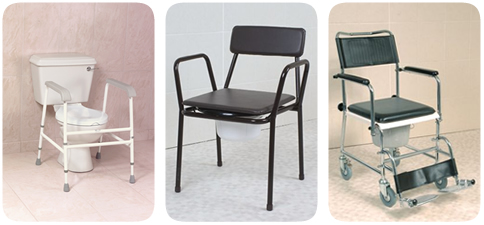
Toilet frame and commodes shown. Photos are provided with permission from NRS Healthcare: https://www.nrshealthcare.co.uk
Toilet equipment to raise the seat can be fitted and removed easily.
Additional rails or frames can be fitted around the W.C. or on a sturdy wall next to the W.C.
Make sure the person doesn’t grab on to radiators, toilet roll holders, door handles or the side of the sink or bath when trying to stand up from the toilet. All of these can be slippery or may come away from the fixings when the persons weight is put on them.
If the space in the toilet is too narrow for the person to use with a walking aid a commode or chemical toilet may be recommended as an alternative. A commode on wheels can be used over a normal W.C if the pan is removed. This can be useful if the person has difficulty with getting on to the toilet in a confined space. They can be seated on the commode in another room and wheeled to the toilet on the commode
If you do have to assist the person when they use the toilet take care to wash your hands before you start and again after. If possible use disposable gloves as well. Assist or encourage to wash their hands after using the toilet.
Keep extra toilet paper and moist wipes within reach and a disposal bag for used wipes or incontinence pads.
If the person has incontinence problems you may find it useful to keep a change of clothes in the bathroom. Incontinence pads are available in a variety of sizes. These are available and are usually ordered by the community nurse at your G.P surgery free of charge. If the person uses a catheter, the community nurses should arrange to change this every six weeks or so depending on the type of catheter. Some people have a regular bowel medicine or treatment for constipation. The district/community nurses may attend to this as part of a person’s care.
It is worth bearing in mind that although incontinence can be embarrassing for the person, there are treatments available to try and some health boards have specialist nurse continence advisers and specialist doctors who treat urinary and bowel problems. Ask your GP about a referral rather than struggle on.
For more information on continence problems please see Topic 3. Practical advice and tips for carers > Continence problems on this website.